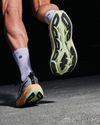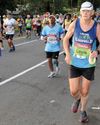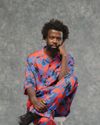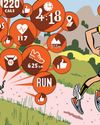
Eliud Kipchoge is the greatest marathon runner ever to lace up a pair of carbon-fibre shoes (or ordinary shoes, for that matter).
Multiple big-city marathon wins, two Olympic Games gold medals, first man under two hours for the distance (albeit in a staged, non-eligible event), and the current 42.2km world record-holder. This is a marathon runner who knows how to train.
So when research came out recently that documented Kipchoge's training, many readers were fascinated, searching painstakingly for the magic formula that makes him the greatest. Because, what secrets might be found out and applied to our training to make us faster?
BACK TO BASICS
Those readers may have been disappointed. First, there are no secrets. No magic formulas. Second, you'd be ill-advised to mimic the specific content of Kipchoge's training, given that he's running 200 to 220km a week - a volume few other humans could get away with. However, we can look behind Kipchoge's numbers, and identify a couple of key principles that when applied to our training, may make us better runners.
For me, the first thing that jumped out is how relatively 'boring' Kipchoge's training is. There is a monotony; an abundance of what we might describe as 'staple' runs - no bells or whistles, no fancy stuff; he just runs, and accumulates hours and hours of low-intensity training.
And consistency is key. We need to avoid the temptation of tinkering, and rather earn our physiological adaptations through disciplined repetition.
This story is from the {{IssueName}} edition of {{MagazineName}}.
Start your 7-day Magzter GOLD free trial to access thousands of curated premium stories, and 9,000+ magazines and newspapers.
Already a subscriber ? Sign In
This story is from the {{IssueName}} edition of {{MagazineName}}.
Start your 7-day Magzter GOLD free trial to access thousands of curated premium stories, and 9,000+ magazines and newspapers.
Already a subscriber? Sign In

LONGOVERDUE PRAISE FOR THE RUNNING SINGLET
In the last decade, the running singlet once reserved for amateur competitors and professional athletes - has gone mainstream, not only on race day but also on everyday runs.

RISE OF THE 'ILLEGAL RUNNING SHOES
Banned shoes emerged at a basketball court long before they found their way onto a marathon course.

CRACKING THE SLEEP CODE
Are you an early bird or a night owl? Perhaps you've assigned yourself another animal after completing an internet quiz. Research is shedding light on the link between well-being and circadian predisposition, but there's no need to rewire yourself. Learn to lean into your biology with our guide.

THE SECRET TO SPEED IS IN YOUP BLOOD
Some of the world's best runners credit this unorthodox Norwegian training method for their success. Is it right for you?

THE MIND OF MASSYN
IN 2024, LOUIS MASSYN WILL ATTEMPT HIS 49TH COMRADES MARATHON AND HE'S LEARNT PLENTY OF LESSONS ALONG THE WAY. HERE'S THE STORY OF HIS AMAZING JOURNEY.

TAKING CHARGE
OUTSPOKEN AND AMBITIOUS, NEW COMRADES RACE MANAGER (AND FORMER WINNER) ANN ASHWORTH IS LOOKING TO TAKE THE RACE INTO THE FUTURE.

A HALF CENTURY OF COMRADES
THIS YEAR, BARRY HOLLAND WILL BE AIMING TO FINISH HIS 50TH CONSECUTIVE COMRADES MARATHON. THIS IS WHAT HAS INSPIRED HIM.

MY RUNNING LIFE
ORDINARY RUNNERS doing EXTRAORDINARY THINGS

Ageing In The Age Of Strava
RECENTLY MY BUDDY Sean sent a text message that said, “Been running a lot of 5:30–6:00 kays early. It feels pretty nice at that pace.”

How To Start A Run When You Don't Feel Like It
I'VE ALWAYS FELT validation when reading a story about writers and their love of procrastination.